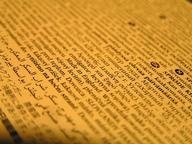Quiz Answer Key and Fun Facts
1. The French word for which country gave its name to leather or fabric with a napped finish?
2. Which African countries gave their names to words in modern spoken Hebrew?
3. Which of the following is NOT a chemical element named after a country?
4. In Arabic and in Greek, which country gave its name to the orange (the citrus fruit)?
5. Nowadays "italic" is mainly used to refer to a computer font with a slight slant, but what is the origin of this term?
6. "Aspamia", the Aramaic word for Spain, was granted which additional meaning in Aramaic?
7. Which island group located in the North Atlantic Ocean gave its name to a type of short trousers?
8. Brazil has a striking similarity to the Hebrew word "Barzel", which means "iron". Which colour connects both these words?
9. A technique originating in China led many languages to adopt the word "china" for domestic porcelain utensils. In modern Hebrew, it is called "kharsina". Which two words are amalgamated to create this word?
10. This would have been a lesser quiz if it didn't mention the turkey. Which of the following is a WRONG translation of its name?
Source: Author
gentlegiant17
This quiz was reviewed by FunTrivia editor
agony before going online.
Any errors found in FunTrivia content are routinely corrected through our feedback system.

